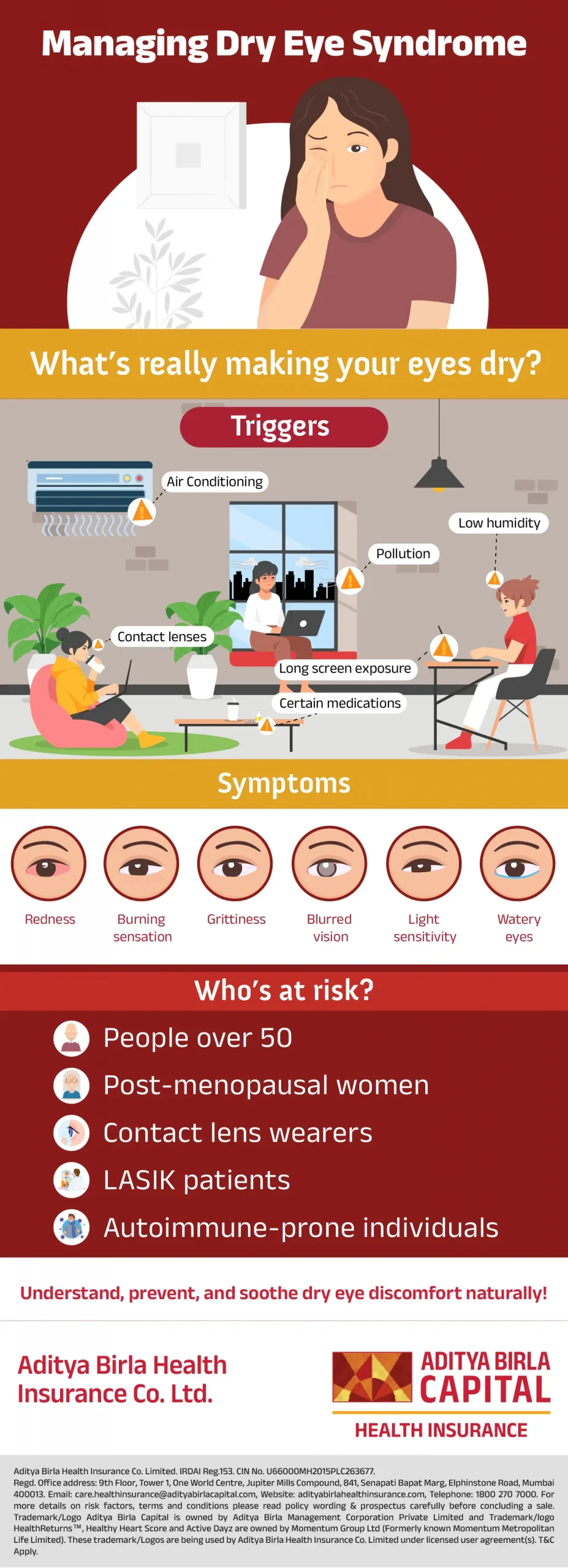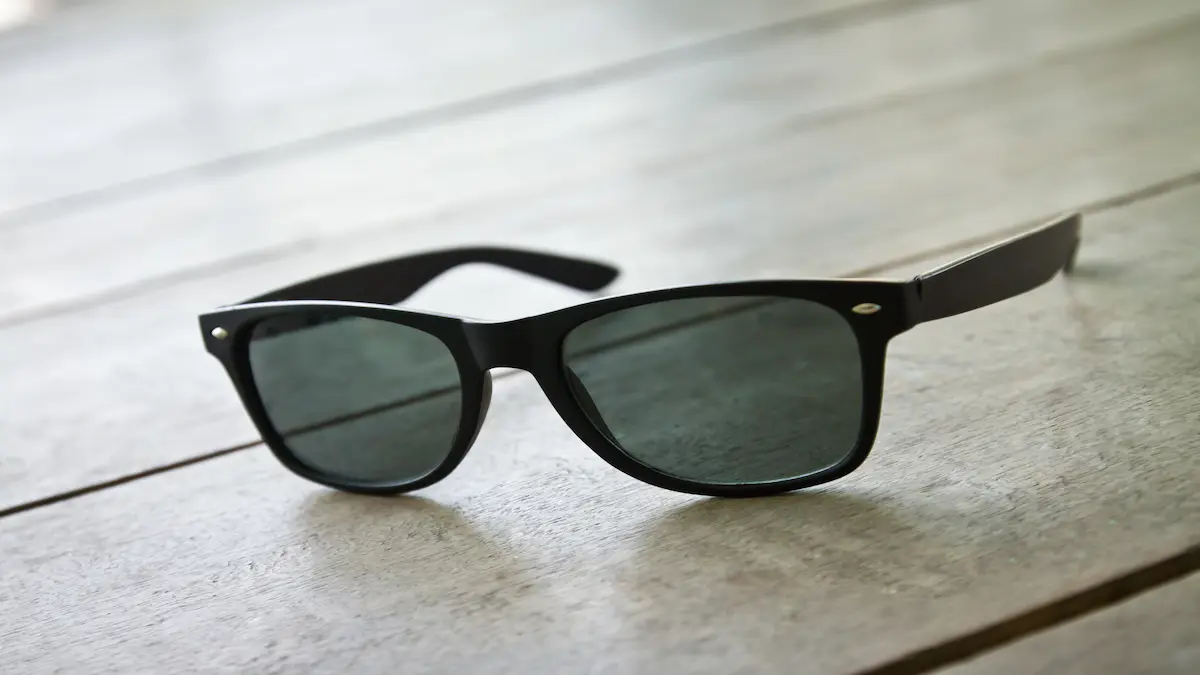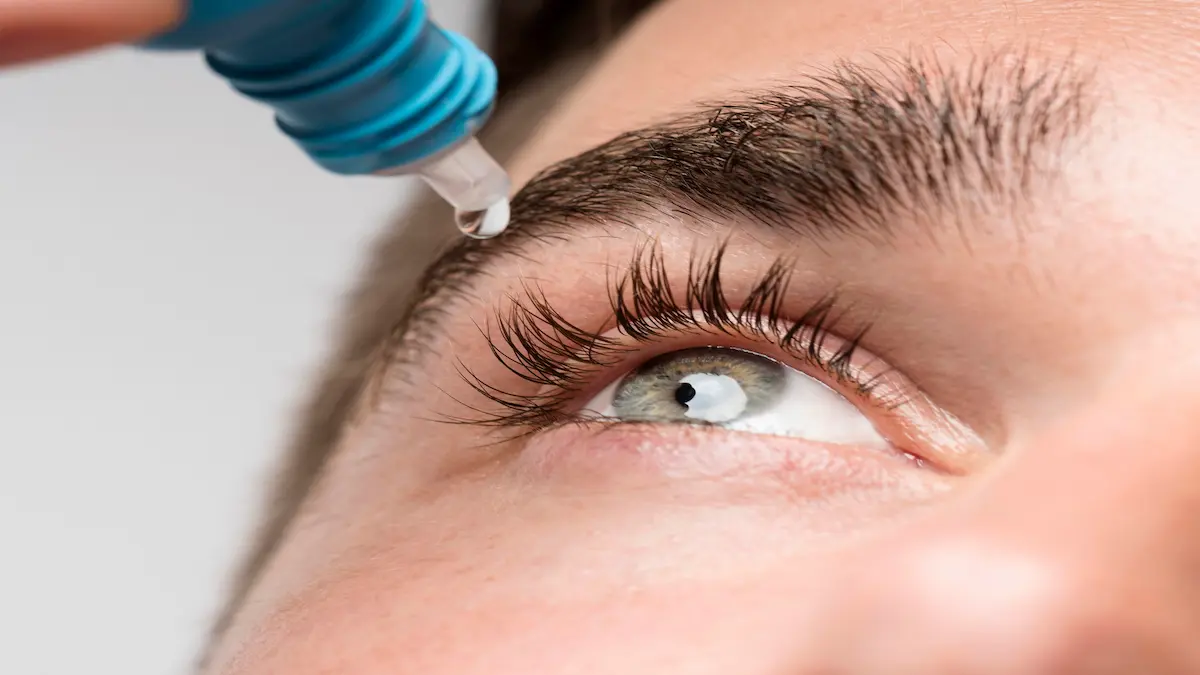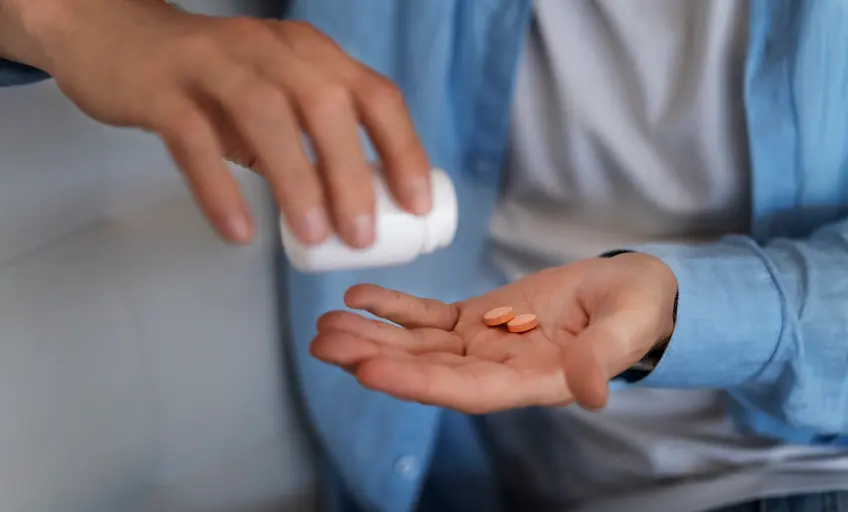
Ever wondered why your eyes feel tired, itchy, or just… dry? Discover what’s behind this common eye condition and how to find relief by practising home remedies for dry eyes.
What is dry eye?
If your eyes sting, burn, appear red, or feel gritty—like sand is stuck in them—you may have dry eye. This condition occurs when the small glands in and around your eyelids do not produce enough tears to maintain healthy eyes and clear vision.
Tears play a vital role by maintaining the eye’s surface, keeping it smooth, comfortable, and hydrated, while also washing away dust and debris and protecting against infection. Healthy eyes produce tears daily to stay moist.
However, certain diseases, medications, or simply aging can cause your eyes to produce fewer tears. Dry eye can also occur when your eyes do not produce the correct type of tears necessary to remove particles or keep the surface properly lubricated.
Types of dry eye
The two primary types of dry eye are as follows:
Aqueous tear-deficient dry eye
Aqueous tear-deficient dry eye occurs when the tear glands cannot produce enough of the fluid component of tears to clean the eye’s surface adequately.
This form of dry eye is also referred to as “painful blindness dry eye.” Various factors, including aging, pollution, or the side effects of certain medications, can cause damage to the tear glands. It is generally more common in women, particularly after menopause.
Evaporative dry eye
The other primary type of dry eye is referred to as evaporative dry eye. This condition is caused by inflammation of another set of glands found in the eyelids, known as the meibomian glands.
Inflammation might cause blockage of the meibomian glands, hindering these glands from producing sufficient oil to prevent tears from evaporating too quickly. This is more commonly found in men.
Home remedies for dry eyes
You can also take steps to relieve the scratchy and irritating symptoms of dry eyes. Try these effective natural remedies for dry eyes to relieve symptoms:
Warm compresses
Tears consist of oil, water, and mucus. Your eyes require all three components to remain moist and healthy. Inflamed and flaky eyelids can block the oil-producing glands along the edge of your eyelid, resulting in dry eye.
To help alleviate irritation and loosen clogged oils:
- Wet a clean washcloth with warm water, wring it out, and place it over your closed eye for at least a minute.
- Gently press the edge of your eyelid with your finger to help squeeze out the clogged oils. The moist heat helps to loosen the clogged oils in the glands.
- Wet the cloth frequently to keep it warm.
You may need warm compresses daily to help reduce inflammation, even after your eyes feel better.
Wash crusty lashes
Cleaning your eyelids, along with the surrounding skin and hair, can help manage any lid inflammation effectively. Apply a small amount of baby shampoo or mild soap to your fingertips and gently massage your closed eye, near the base of your eyelashes.
Blink more often
Staring at a computer decreases the frequency of blinking per minute. Therefore, make an effort to blink frequently while you’re online. Adhere to the 20/20 rule: close your eyes every 20 minutes for 20 seconds.
Another simple trick to keep your eyes moist while using the computer is to set your screen below eye level. This way, you won’t need to open your eyes as wide, which may help slow down tear evaporation between blinks.
Eat (naturally) oily fish
Salmon and tuna, along with sardines, trout, and mackerel, all contain omega-3 fatty acids. Research indicates that these healthy fats enhance the function of the oil-producing glands in your eyes, which can reduce irritation.
Other foods that are naturally high in omega-3 fats include walnuts, vegetable oils (such as canola and soybean oil), and flaxseed. You can also take omega-3 fatty acids in the form of a pill or tablet. Consult your doctor before starting any new supplement to ensure it won’t adversely affect any conditions you have or medications you are taking.
पानी की कमी न होने दें
Every part of your body needs water to stay healthy, including your eyes. Drinking water helps keep them moist. However, don’t wait until you’re thirsty to sip water; by that time, you may already be slightly dehydrated.
Instead, aim for eight to ten glasses throughout the day. If you don’t like plain water, any other liquid that doesn’t contain alcohol or caffeine will suffice. Water-rich foods—such as cucumbers and watermelon—also count.
One way to determine if you are well-hydrated is to check your urine. You’re likely getting enough fluids if it is colorless or light yellow.
Wear wraparound sunglasses

This style can help shield your eyes from dry winds, which make tears evaporate more rapidly. At home, avoid directing air from your hair dryer, air conditioner, or fan toward your eyes.
Use a humidifier and a filter
This can add moisture to dry indoor air. Placing a pan of water near your heater or radiator has the same effect. An air purifier that filters dust and other particles may also help prevent dry eyes.
Dos and don’ts for eye drops
Over-the-counter eye drops function similarly to your own tears and may provide relief. Some brands contain added preservatives that help them last longer, but using them too frequently may irritate your eyes. Non-preservative eye drops and thicker ointments are also offered. Your doctor can inform you whether these would be beneficial or if you require an alternative.
What doesn’t work for dry eyes: drops that reduce redness, which can irritate your eyes more over time.
Ensure you’re using a brand of drops recommended by your doctor, instead of any random product you find on the shelf.
Limit screen time
The digital age poses challenges for individuals with dry eyes. Spending time in front of screens is linked to increased symptoms. Consider taking regular breaks from your devices.
Adjust your environment
Sitting close to a fan or under an air conditioning vent can dry your eyes. When experiencing symptoms, think about how to modify your environment to minimize direct air currents.
Add omega-3s to your diet
Research results vary regarding the impact of omega-3 fatty acids on reducing dry eye symptoms, although some studies show promise. Consult your doctor about the potential benefits of an omega-3 supplement for your dry eyes.
Increase your fluids
The amount of fluid available to your eyes is partly determined by your total fluid intake. Consider increasing your liquid intake throughout the day to boost hydration.
Clean your eyelids
Cleaning your eyelids may help to open clogged oil glands, which can allow for increased moisture. Adhere to the following instructions for using an eyelid scrub:
- Wash your hands.
- Remove your contact lenses if you keep wearing them during blepharitis outbreaks (inflammation of the eyelids).
- Close your eyes.
- Gently rub your eyelids and eyelashes with a back-and-forth, horizontal motion.
- If you notice crusty residue on your eyelashes upon waking, gently rub it off with a pad using a downward motion.
- You can also apply a warm compress to your eyes to soften the crusts before using eyelid scrub pads.
- Avoid using the same area of a pad on both eyes. Instead, use one pad or a section of a pad for each eye.
- Repeat once or twice daily, unless directed otherwise by a doctor.
Apply a gel or moisturizing eye drops

Some dry eye products are available as drops, while others are offered in gels. Over-the-counter (OTC) eye drops provide a convenient solution for lubricating dry eyes. Look for options that are without preservatives to reduce irritation.
Wear sunglasses outdoors
When light sensitivity becomes bothersome, put on some shades (even indoors).
Cut back on alcohol
Alcohol is recognized for its dehydrating effects. Avoid drinking alcohol. This might assist with dry eyes.
Prioritize sleep
Poor sleep can exacerbate dry eye symptoms by decreasing tear production. Consider practising healthy sleep hygiene to see if dryness improves.
Add antioxidant-rich foods
Many antioxidants support eye health, including lutein, zeaxanthin, vitamin A, and omega-3 Focus on incorporating foods that are rich in these nutrients, such as leafy greens, kiwi, broccoli, carrots, and sweet potatoes.
When to see a doctor
Often, a bout of dry eyes is a temporary irritation. If your symptoms worsen over time, persist for weeks, or do not improve with घरेलू नुस्खे, consult your doctor. They can help assess if you require more targeted treatment.
Blink away discomfort
Dry eyes might be common, but they don’t have to be your everyday norm. With the right care and lifestyle tweaks, relief is just a blink away.
FAQs about natural remedies
Curious about soothing dry eyes naturally? Here are some frequently asked questions about home remedies and holistic relief.
- What is the best home remedy for dry eyes?
One of the best home remedies for dry eyes is applying a warm compress to your closed eyelids. It helps unclog oil glands, improves tear quality, and provides soothing relief. Pair it with regular blinking, staying hydrated, and omega-3-rich foods (like flaxseeds or walnuts) for lasting benefits.
- Are there foods that worsen dry eye symptoms?
Yes, certain foods can worsen dry eye symptoms, especially those that contribute to inflammation or dehydration. Here are some to watch out for:
- High-sugar foods: Can spike inflammation and affect tear production.
- Fried and processed foods: Often high in trans fats, which may disrupt healthy oil glands in your eyes.
- Salty snacks: Excess sodium can lead to dehydration, reducing tear volume.
- Caffeinated or alcoholic drinks: May have a diuretic effect (increased urine production), leading to dry eyes in some individuals.
Moderation is key—balancing your diet with omega-3s, vitamin A, and hydrating foods can support overall eye health.
- Can you use honey for dry eyes?
Yes, but only in the right form—opt for clinically formulated honey-based eye drops and consult an eye care professional before use.
- Can dry eyes cause blurry vision?
Yes, dry eyes can cause blurry vision, especially when your tear film becomes unstable. If you notice persistent blur, check with an eye doctor.
- How long does it take for home remedies to work for dry eyes?
The time it takes for home remedies to work for dry eyes can vary from person to person, but many people start noticing relief within a few days to a couple of weeks with consistent care.
Key Takeaways
- Dry eyes happen when your tears can’t provide enough lubrication for your eyes.
- Aqueous tear-deficient dry eyes and evaporative dry eyes are the two main types.
- Remedies include warm compresses, frequent blinking, and staying hydrated.
Stay tuned to the Activ Living Community. Keep up to date with the latest health tips and trends through expert videos, podcasts, articles, and much more on पोषण, फिटनेस, सचेतन, और लाइफस्टाइल से जुड़ी बीमारियां like Asthma, Blood Pressure, Cholesterol, and Diabetes. Activ Living ke saath sahi sehat ki shuruat ABHI karo.
You may also be interested in the following blogs:
- 5 Tips For Improving Your Eyesight And Maintaining Healthy Vision
- How To Break A Phone Addiction: Mindful Living In The Digital Age
Popular Searches
How to lower blood pressure | Fruits good for liver | Unhealthy foods | रागी के लाभ | बेसल मेटाबोलिक रेट | हाई ब्लड प्रेशर के लिए एक्यूप्रेशर पॉइंट्स | Ayurvedic medicine for blood pressure | How to control cholesterol at home | Homeopathy for Asthma | Biological Age | Home remedies for TB | Natural beta blockers | Negative effects of internet | Types of walking | ब्लड प्रेशर कैलकुलेटर | ब्लड शुगर कैलकुलेटर | BMI कैलकुलेटर





 1800-270-7000
1800-270-7000










